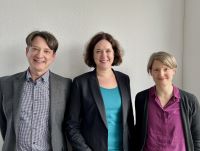
Contact:
Prof. Dr. Sebastian Fehrler
SOCIUM Research Center on Inequality and Social Policy
Mary-Somerville-Straße 7
28359 Bremen
Phone: +49 421 218-58590
E-Mail: sebastian.fehrler@uni-bremen.de
Notifications of the SOCIUM since 2015, but also older notifications of the ZeS and EMPAS in the period 2014 to 2008.

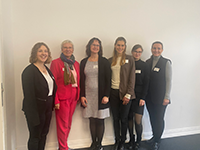
Gesundheitskompetenzen schon im frühen Alter stärken – dafür sind in Grundschulen im Land Bremen sogenannte Gesundheitsfachkräfte zuständig. Bei einem Fachtag, organisiert von der Arbeitsgruppe von Prof. Eva Quante-Brandt des SOCIUMs, tauschten sich knapp 100 Teilnehmende aus Wissenschaft und Praxis zu diesem Thema aus. Dabei war der Blick nicht nur auf Bremen gerichtet: Prof. Pernilla Garmy stellte in ihrem Vortrag das schwedische Konzept der „school nurses“ vor.
Seit 2018 arbeiten Gesundheitsfachkräfte in Bremer und Bremerhavener Grundschulen in sozial schwächeren Stadtteilen und erklären und stärken gesunde Verhaltensweisen. Vom reichhaltigen Frühstück, über ausreichend Bewegung bis zum gesunden Umgang mit Medien – die Themen sind dabei vielfältig, ebenso die Methoden, mit denen gearbeitet wird. Was ursprünglich als Modellprojekt begann, wurde im Jahr 2021 verstetigt. 15 Gesundheitsfachkräfte sind mittlerweile beim Bremer Gesundheitsamt angestellt und werden in 23 Schulen eingesetzt – ein „Leuchtturmprojekt“ wie Amtsleiter Dr. Jörn Moock in seinem Grußwort zum Fachtag am 26.11.2024 sagte. Unter dem Titel „Gesundheitsfachkräfte an Schulen - Gesundheitskompetenz stärken und gesundheitliche Ungleichheiten überwinden" wurde ein Tag lang im Haus der Wissenschaft diskutiert. Im Zentrum des gemeinsamen Austauschs von Wissenschaftler:innen, Gesundheitsfachkräften, Studierenden und Lehrkräften stand vor allem die Frage, wie das Konzept der Gesundheitsfachkräfte weiterentwickelt werden kann. Dazu gab zu Beginn Prof. Pernilla Garmy, Professorin für Pflege an der Universität Kristianstad (Schweden), einen wichtigen Input, indem sie in ihrem Vortrag das schwedische Modell der „school nurses“ vorstellte.
Anders als in Deutschland ist im schwedischen Schulgesetz festgelegt, dass alle Schulen Zugang zu einer school nurse haben müssen. Diese ist wie die Bremer Gesundheitsfachkräfte für Prävention und die Aufklärung über, beziehungsweise die Stärkung von, gesunden Verhaltensweisen zuständig, übernimmt aber auch andere Aufgaben wie Impfungen. In regelmäßigen Gesprächen mit den Schüler:innen und ihren Eltern beraten die school nurses zu verschiedenen Gesundheitsfragen: „Die school nurses entlasten damit die Kinderärzte und -ärztinnen in Schweden sehr“, sagte Prof. Garmy. Neben den Kindern und ihren Eltern vermitteln die school nurses auch den Lehrkräften wichtiges Wissen, beispielsweise über chronische Krankheiten ihrer Schüler:innen und wie damit umgegangen werden muss.
An die schwedische Perspektive schlossen kurze Vorträge zum Bremer Konzept an. Lisa Kühne, Hanna Richter und Tatiana Mamontova stellten ihre anwendungsorientierte Forschung aus dem SOCIUM (Universität Bremen) vor. Dabei standen die Auswertung von Gesundheitsdaten von Bremer Grundschüler:innen, die Netzwerkarbeit von Gesundheitsfachkräften in Stadtteilen und die organisationale Gesundheitskompetenz an Grundschulen im Mittelpunkt. Aus Sicht der Praxis stellten Claudia Kwirand (Referatsleitung, Gesundheitsamt Bremen) und Ceylan Scharrelmann (Gesundheitsfachkraft) die Arbeit der Bremer Gesundheitsfachkräfte vor. Daran anschließend präsentierte Jan Spaar eine Software, die an der Technischen Hochschule Mittelhessen derzeit zur Dokumentation der Arbeit von Gesundheitsfachkräften in Schulen entwickelt wird.
Der grundlegende Unterschied zwischen dem schwedischen Konzept und deutschen Ansätzen, Gesundheitsfachkräfte in Schulen einzubinden, besteht vor allem in der Verankerung der school nurses im schwedischen Bildungssystem. In Deutschland, beispielsweise in Bremen, sind Gesundheitsfachkräfte hingegen in den Öffentlichen Gesundheitsdienst, und damit in das Gesundheitssystem, integriert. Die Frage, wie Bildungs- und Gesundheitssystem in Deutschland zusammenarbeiten können, um noch mehr Gesundheitsfachkräfte auch in anderen Bereichen einzusetzen, bildete einen von verschiedenen Diskussionspunkten, denen sich die Teilnehmenden in interaktiven Formaten wie einem World Café widmeten. Eine weitere zentrale Fragestellung des Tages betraf die Evaluation, also die Frage, wie die Wirksamkeit der Arbeit von Gesundheitsfachkräften in Schulen wissenschaftlich gemessen werden kann. Prof Garmy sagte dazu: „Es braucht hier sowohl quantitative Fragebögen als auch qualitative Interviews. Dabei ist es wichtig auch den Fokus auf die selbst berichteten Angaben der Kinder zu legen“.
In ihrem Fazit zum Abschluss des Tages blickte Prof. Eva Quante-Brandt auf Möglichkeiten, den Einsatz der Gesundheitsfachkräfte zu erweitern: „Eine wichtige Perspektive ist, die Gesundheitsfachkräfte auch an den weiterführenden Schulen einzusetzen, da insbesondere mit der Pubertät nochmal neue Fragen und Themen für Jugendliche aufkommen“. Außerdem müssten sich die beiden Systeme Bildung und Gesundheit der Herausforderung stellen, hier noch enger zusammenzuarbeiten: „Vielleicht könnte das Konzept der Ganztagsschulen ein wichtiger Eisbrecher sein, um die verschiedenen Akteure und Akteurinnen beider Systeme näher zusammenzubringen“.

Die Deutsche Vereinigung für Politikwissenschaft (DVPW) ist mit derzeit über 2.000 Mitgliedern die größte Fachorganisationen für Politikwissenschaft. Sie vertritt nicht nur das Fach etwa bei Anhörungen durch Parlamente oder gegenüber den Kultusbehörden für das Schulfach Politik, sondern schlägt auch die Vertreterinnen und Vertreter des Fachs für die Wahl der Fachkollegien der Deutschen Forschungsgemeinschaft (DFG) vor. Der neue Vorsitz ist wie der neue Vorstand für eine Drei-Jahres-Periode (bis 2027) gewählt. Markus Tepe war bereits im bisherigen Vorstand (2021-2024) stellvertretender Vorsitzender der Vereinigung.
Markus Tepe ist seit Oktober 2023 Professor für Politikwissenschaft mit dem Schwerpunkt Politisches System der Bundesrepublik sowie Theorie und Empirie des Wohlfahrtsstaates an der Universität Bremen sowie Abteilungsleiter am SOCIUM. Er studierte Politikwissenschaft, Öffentliches Recht und Wirtschaftspolitik in Münster und promovierte an der Freien Universität Berlin. Forschungsaufenthalte führten ihn unter anderem an die Universitäten Stanford und Yale. Tepe war Juniorprofessor für Positive Politische Theorie und zuletzt Professor für das Politische System Deutschlands an der Universität Oldenburg. Seine Forschung befasst sich mit den Determinanten von Wahl- und Entscheidungsverhalten in Politik und Verwaltung.
Weitere Informationen
https://www.dvpw.de/informationen/infos/details/news/neuer-dvpw-vorstand-gewaehlt-1
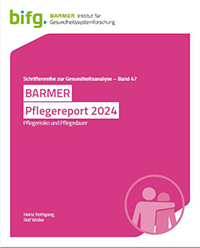
The BARMER Long-Term Care Report, which is published annually, assesses current long-term care policy and evaluates the long-term care situation. It also includes a focus chapter, which in this year’s Report the authors Prof. Heinz Rothgang and Dr. Rolf Müller (both SOCIUM) examine the duration of time that people are dependent on long-term care and how this affects long-term care costs.
Higher costs due to more staff and higher wages in long-term care
Last year, co-payments in nursing homes continued to rise and now amount to a national average of more than 2,300 euros – taking all long-term care insurance benefits into account. This is not least the result of staff increases due to a new standardized procedure developed by the University of Bremen for calculating staffing requirements, as well as the 2022 legislation on complying with collective bargaining agreements for nursing and support staff in long-term care. The latter stipulates that care facilities without a collective agreement introduce one, align wages as closely as possible to an existing one, or ensure a regionally customary wage level for nursing staff. This has led to a significant increase in wages in long-term care: Between December 2021 and December 2023, the wage level for skilled care workers and assistants rose by 17 and 24 percent, respectively, while the increase in nursing, as in the rest of the economy, was only six to twelve percent. The increased costs are thus the result of strategic measures to help improve long-term care in Germany. However, they must be compensated for by the legislature through an effective limitation of co-payments if the legitimacy of long-term care insurance – introduced in 1994 to prevent care-related impoverishment – is not to be damaged.
People are in need of long-term care for longer durations – care costs will continue to rise
This year’s focus chapter primarily looks at the increasing duration of care and the costs involved that can be expected for the long-term care system. A comparison of the data of people in need of care who died in 2022 with projections of the care durations for people who became care dependent in 2022, shows that a significant increase in the duration of care is to be expected. Of the BARMER insurees who died in 2022, 77 percent received long-term care insurance benefits in their lifetime, usually towards the end of their lives. These benefits were received for an average of 3.8 years. For those who became care dependent in 2022, the duration of care can be calculated in advance from cross-sectional data – using the same method used by the Federal Statistical Office to calculate the life expectancy of newborns. According to this, a care duration of 7.5 years is to be expected for people who became care dependent in 2022, i.e., almost twice as high as that of those who died in 2022.
The increased duration of care is also a consequence of the broadened definition of the need for long-term care, as people receive care services earlier and thus longer. Overall, the authors come to the conclusion that the duration of care increases by 100% and expenditure by 50%. Expenditure is rising less sharply, as the additional periods in need of care are mainly spent in lower care grades and with the receipt of attendance allowance, which entails significantly lower expenditure than care benefits in kind provided by outpatient care services or nursing home care.
Long-term financial security is essential for long-term care insurance
In addition to the increasing number of people in need of care due to demographic developments in the coming years and the rising costs due to more staff and higher wages, longer care durations must also be taken into account. These will even further increase the total expenditure of social long-term care insurance per person in new cohorts of care dependents. Long-term care insurance therefore needs significantly greater financial resources in the long run: “The recently initiated contribution increase by Federal Health Minister Karl Lauterbach can at most provide a short-term remedy and, at best, bridge the coming year. For long-term financial security, financing from tax revenues and financial equalization with private long-term care insurance are needed,” remarked Prof. Rothgang.
 Foto: Falk Weiss
Foto: Falk Weiss2025 werden 14 herausragende Persönlichkeiten aus Wissenschaft und Kultur am Thomas Mann House in Los Angeles zum Thema „Across Boundaries“ arbeiten. Nils C. Kumkar wird in diesem Rahmen von Januar bis März zu Verschwörungstheorien und ihrer Rolle in der gesellschaftlichen Verarbeitung der aktuellen Präsidentschaftswahl forschen.
Als das Auswärtige Amt 2016 das ehemalige Wohnhaus von Thomas Mann in Kalifornien erwarb, sollte daraus ein „Ort des Nachdenkens und der Diskussion über gemeinsame Herausforderungen unserer Zeit“ werden. Um diesen Anspruch mit Leben zu erfüllen, schreibt das Thomas Mann House unter anderem ein Residenzprogramm aus, dessen Ziel es ist, sowohl amerikanische wie auch deutsche Gesprächspartnerinnen und Gesprächspartner unterschiedlichster Fachrichtungen, Traditionen und Ansichten miteinander ins Gespräch zu bringen. Das Programm wird unter anderem von der Berthold Leibinger-, der Krupp- sowie der Bosch-Stiftung und dem Auswärtigen Amt gefördert.
Nils C. Kumkar studierte Soziologie und Volkswirtschaftslehre in Göttingen und an der University of California at Los Angeles. Er promovierte 2016 in Leipzig mit einer Arbeit zu den Krisenprotesten in den USA und Deutschland. Seit 2016 ist er wissenschaftlicher Mitarbeiter am SOCIUM. Seine Forschungsschwerpunkte sind soziale Ungleichheit, neue Medien, Protest und Kritik, sowie insbesondere Rechtspopulismus und Verschwörungstheorien. Die Ergebnisse seiner Forschung vermittelt er immer wieder auch jenseits des Fachpublikums einer breiten Öffentlichkeit in Presse und Rundfunk. 2022 veröffentlichte er im Berliner Suhrkamp Verlag ein vieldiskutiertes Buch zu „Alternativen Fakten: Zur Praxis der kommunikativen Erkenntnisverweigerung“.
Link:
https://www.vatmh.org/de/tm-fellows-details/grant/612-kumkar.html

In Germany, relatives who provide informal care for their relatives can apply for long-term care leave. In her new postdoc project, Dr. Johanna Fischer (Department of Health, Long-Term Care and Pensions) examines the respective policies in EU countries and especially in Germany and Austria.
Long-term care for older persons faces a variety of problems – not only in Germany. The number of people in need of care will continue to rise in the coming years, while there is a shortage of care workers and places in nursing homes are becoming increasingly scarce. Home care therefore plays an important role, both now and in the future. Informal caregivers, mostly female family members, often face the issue of combining paid work and care.
To counter this problem, many welfare states have established care leave, which constitutes an increasingly popular policy measure for supporting work-care conciliation. However, care leave policies are very heterogenous, for instance as regards target group, duration and payment. In her project "Work-care conciliation policies for informal elder care: Comparing the generosity of long-term care leave schemes in Europe," Dr. Johanna Fischer will look at the different policies in a European comparison. The project is funded by the Central Research Development Fund of the University of Bremen for three years starting in March 2025.
In her project, she first surveys the design of such care leave in all 27 EU states, before then explaining the differences between the countries. Afterwards, she examines the introduction of care leave policies in Germany and Austria in two qualitative case studies qualitative comparative analysis. The focus of the latter is on the political factors and debates that accompanied the introduction of the legislation.
Dr. Johanna Fischer is a political scientist and received her doctorate in 2021 from the University of Bremen on the emergence of social policies for long-term care in a global comparison. Since 2022, she has been a member of the project "Global Dynamics of Long-Term Care Policies" of the Collaborative Research Centre "Global Dynamics of Social Policy". With the funding line "Independent Projects for Postdocs", the Central Research Development Fund of the University of Bremen supports postdocs in the development of their research profiles and their scientific careers.
Text: Maren Emde / University of Bremen
Photo: University of Bremen / Patrick Pollmeier
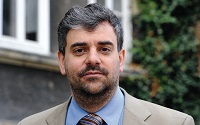
Prof. Heinz Rothgang, Head of the Department of Health, Long-Term Care and Pensions, has been appointed to the Scientific Advisory Board of the "Scientific Institute of the AOK" (Wissenschaftliches Institut der AOK, WIdO) for another term of office.
The WIdO carries out research for the AOK, aiming to improve the quality of the healthcare system and to make it more efficient. The Scientific Advisory Board advises and supports these tasks by contributing their scientific expertise and experience.
Heinz Rothgang has been a member of the Scientific Advisory Board of the WIdO since 2009. Scientific advice such as this is one of the department's important transfer activities.
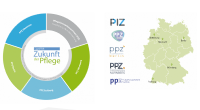
To improve long-term care using digital solutions while at the same time reducing the workload for carers – that is the aim of the research cluster “Future of Care”, funded by the Federal Ministry of Education and Research (BMBF). The main focus of the second funding phase, which has now commenced, is the transfer of new technologies into practice. An important building block for this is the Nursing Care Innovation Center (Pflegeinnovationszentrum, or PIZ) in Oldenburg and Bremen.
Today, long-term care in Germany is confronted with immense challenges, including a rapidly growing number of people in need of care and a glaring shortage of qualified carers. At the same time, care interventions are becoming increasingly complex. In order to tackle these issues, the Ministry of Education and Research is supporting the development and probing of new care technologies.
Since 2017, the “Future of Care” cluster has synergized social and technological innovations; researchers, businesses and stakeholders in the field co-operated with users and worked on developing new products to facilitate and improve routine long-term care work in Germany. As a first measure, the Care Cluster commenced its operations in 2017 at the Nursing Care Innovation Center – a hitherto unique institution in Germany. Here, engineers from OFFIS in Oldenburg explore new technologies in collaboration with nursing-care researchers (headed by Prof. Dr. Karin Wolf-Ostermann, Institute for Public Health and Nursing Research), and long-term care economists (headed by Prof. Dr. Heinz Rothgang, SOCIUM Research Center on Inequality and Social Policy) at the University of Bremen. Ethical, social and legal aspects are also a key factor in this context, and are investigated at the University of Oldenburg.
After the successful first phase, the research work is now entering phase two, which entails the development of an “innovation and transfer hub”. While in the first phase the focus lay on the development and trial of new technologies, the second phase comprises the transfer and establishment of these technologies into broad practice. They include, for example, robotic systems to reduce fatigue in carers caused by physically demanding work, or technologies to support telecare provision, e.g. assessing a person’s health status using sensor technology.
The University of Bremen contributes with the participation of comprehensive expertise in nursing and care research, long-term care economics and healthcare research, with a particular focus on digital care technologies. “Technological innovations can take the load off routine carework, but they must be implemented sensibly in practical care provision and integrated into the work of carers,” says Professor Dr. Karin Wolf-Ostermann. The Bremen scientists analyse for instance the requirements for technological support in various inpatient and outpatient care situations, explore how technological innovations such as smart watches and other “wearables” can be integrated into everyday care, and address issues relating to the evaluation of technology deployment. “With our experience, our high profile research areas and our networks we can mediate between the requirements and demands in practical care, the interests of developers, and science,” Prof. Dr. Heinz Rothgang explains.
Taken together, the “Future of Care” cluster will be funded to the tune of around 20 million euros in the coming five years. Apart from PIZ, four so-called nursing practice centres (Pflegepraxiszentren, or PPZ) in Berlin, Freiburg, Hanover and Nuremberg will play a major role in the implementation and evaluation of technologies and products.

Laura Maaß, PhD student in the department "Health, Long-term Care and Pensions,” has achieved great success in her scientific career early on: The paper "International perspectives on measuring national digital public health system maturity through a multidisciplinary Delphi study," which she co-authored with Hajo Zeeb and Heinz Rothgang, is published in the renowned Nature journal npj Digital Medicine.
To the press release of the LeibnizScience Campus.
Laura Maaß also talks about her research as well as the opportunities and challenges as a young scientist in the current episode of the Digital Public Health Podcast (unfortunately, only in German).